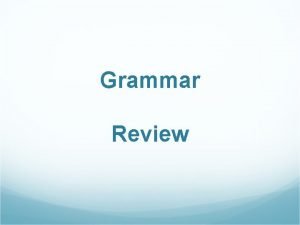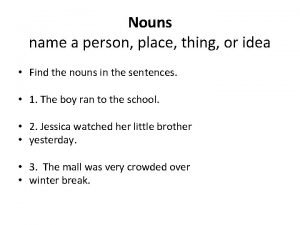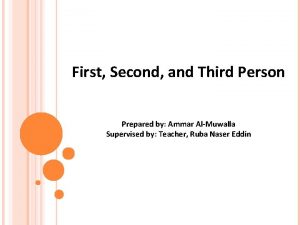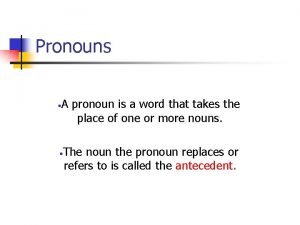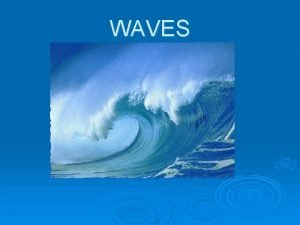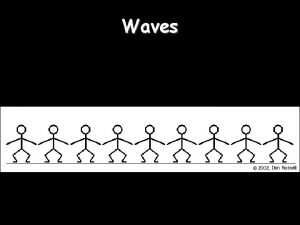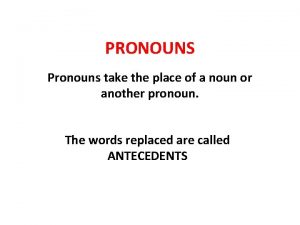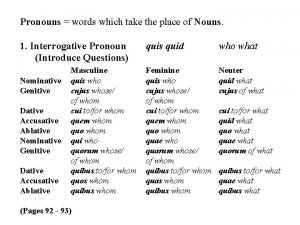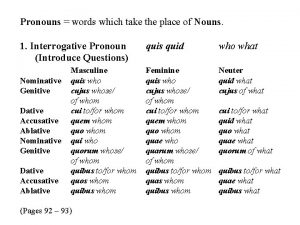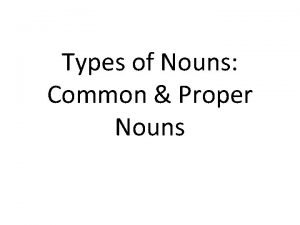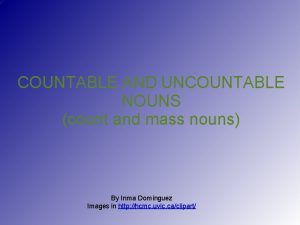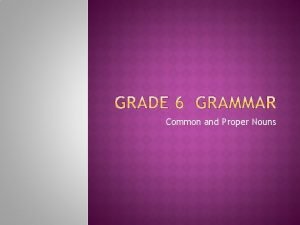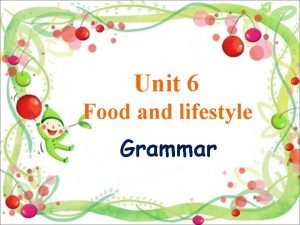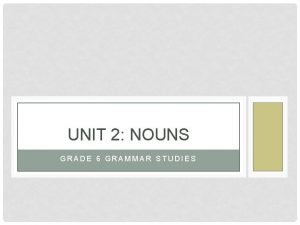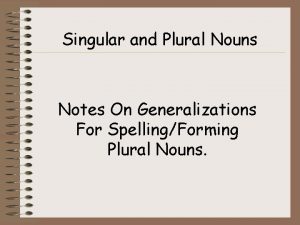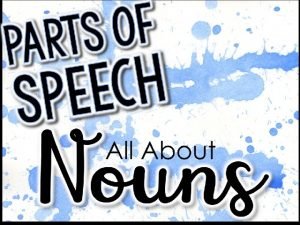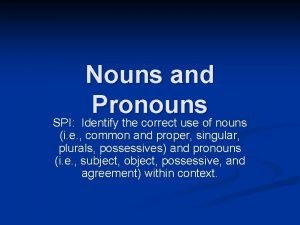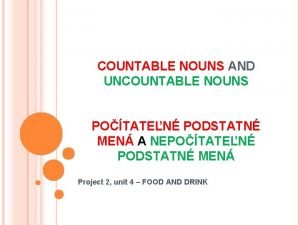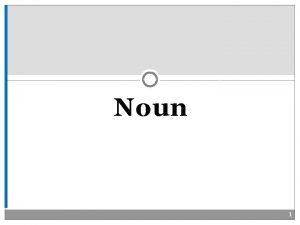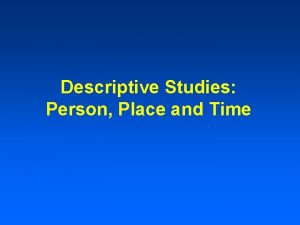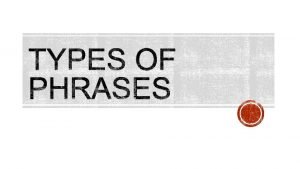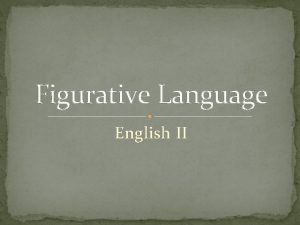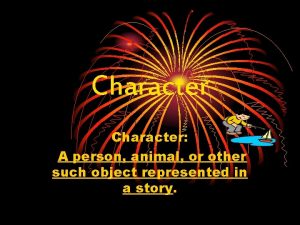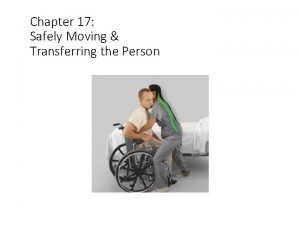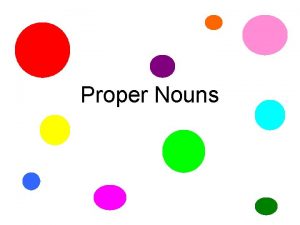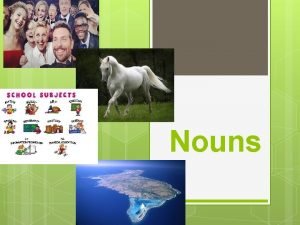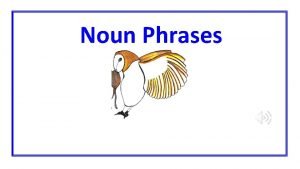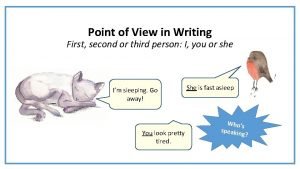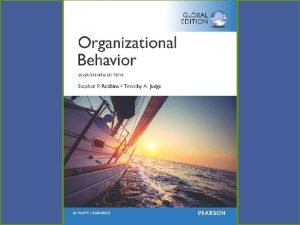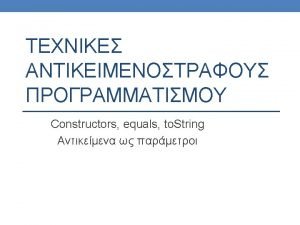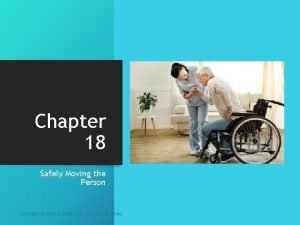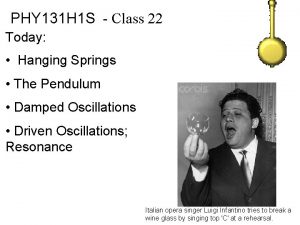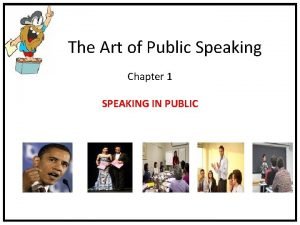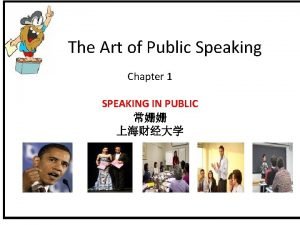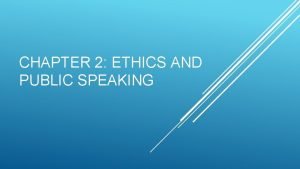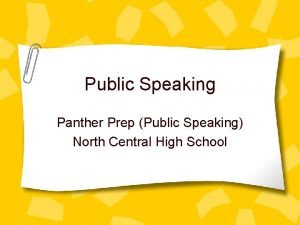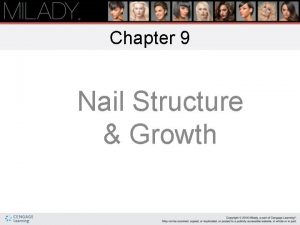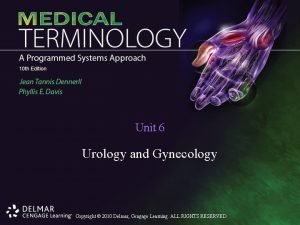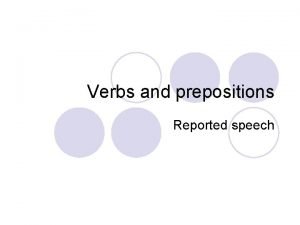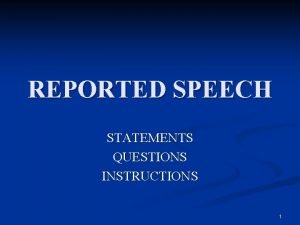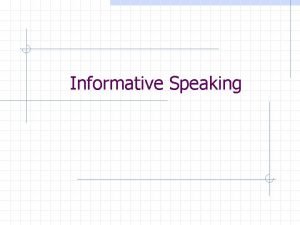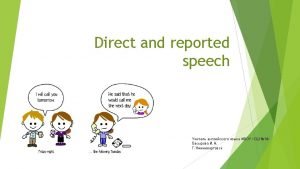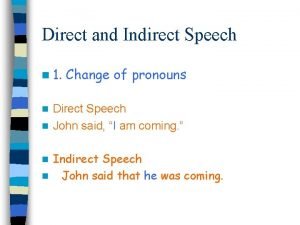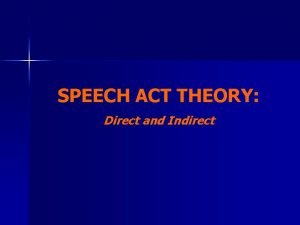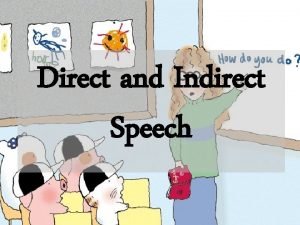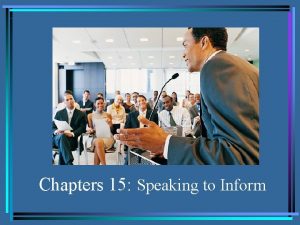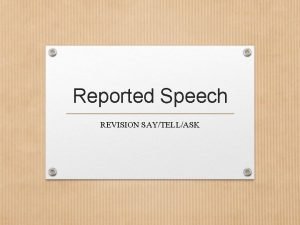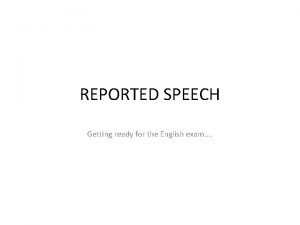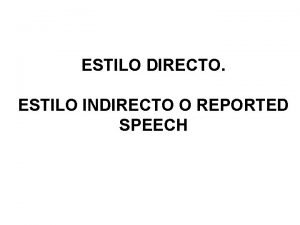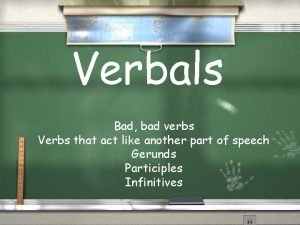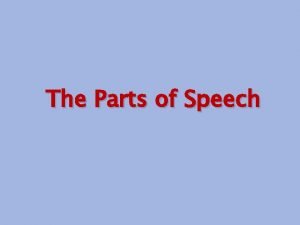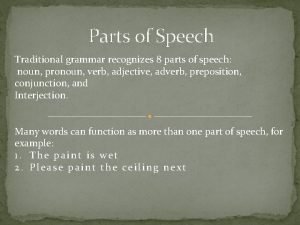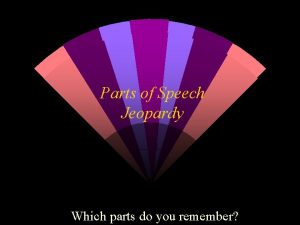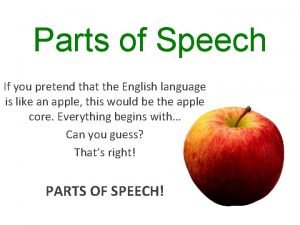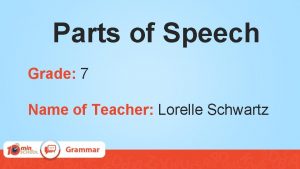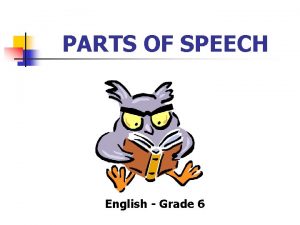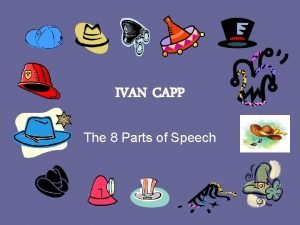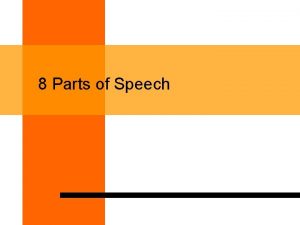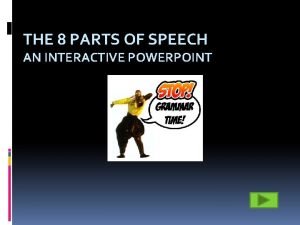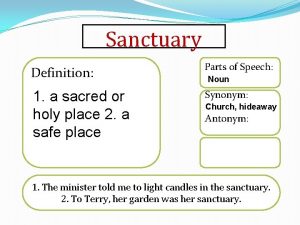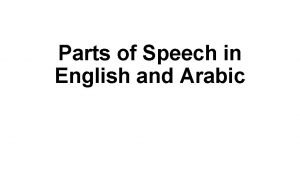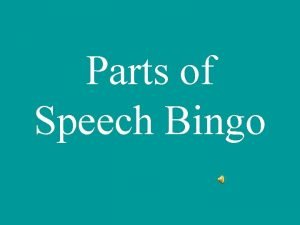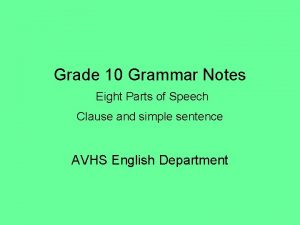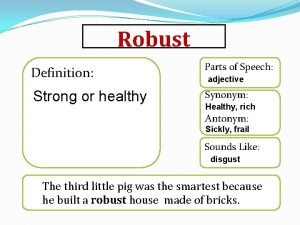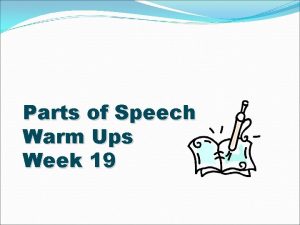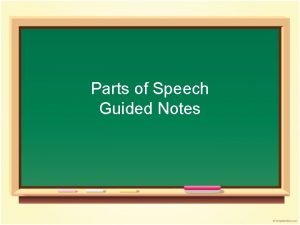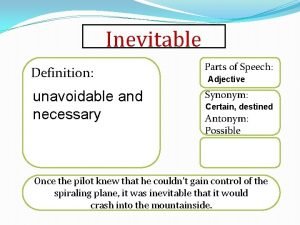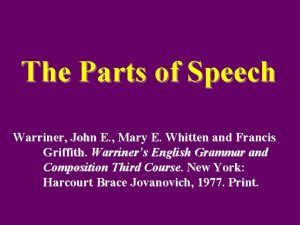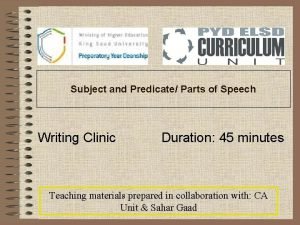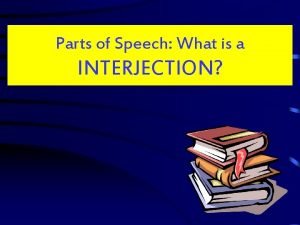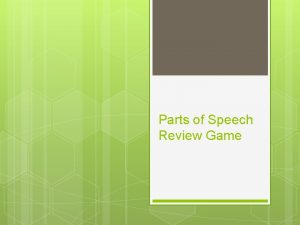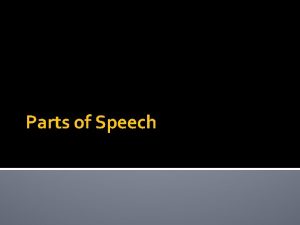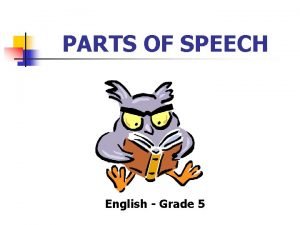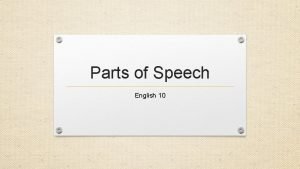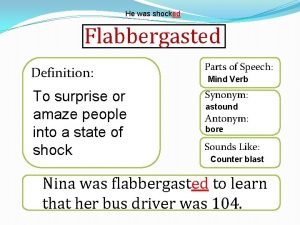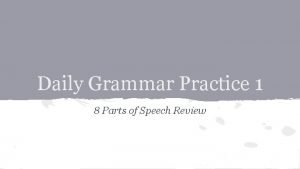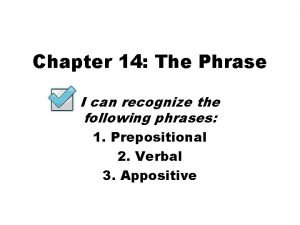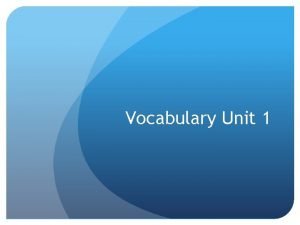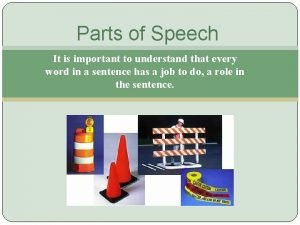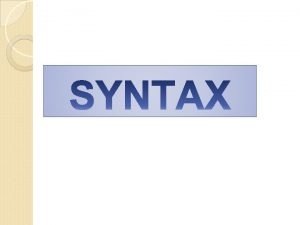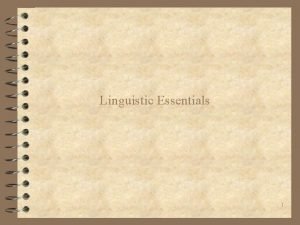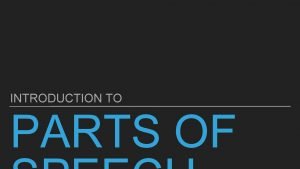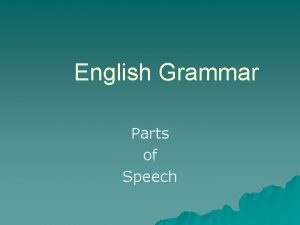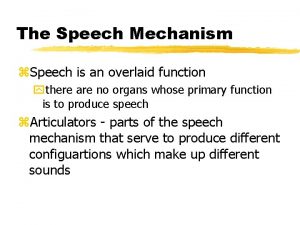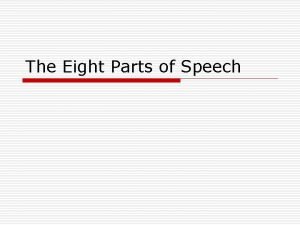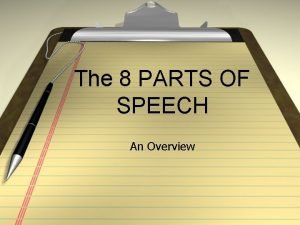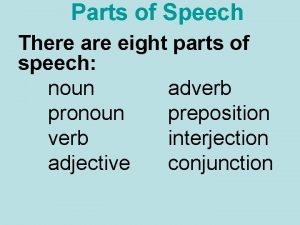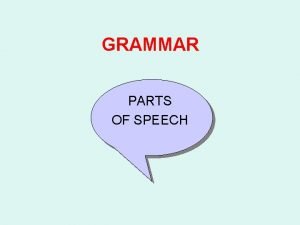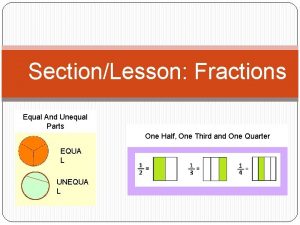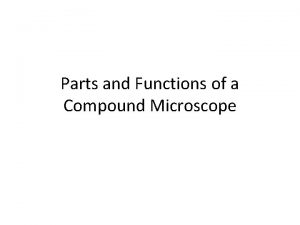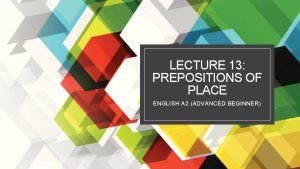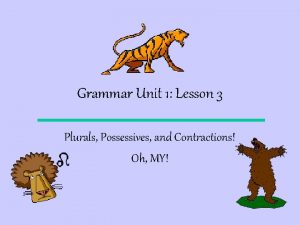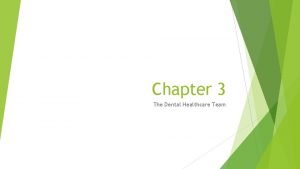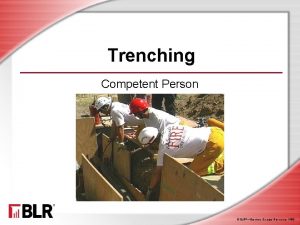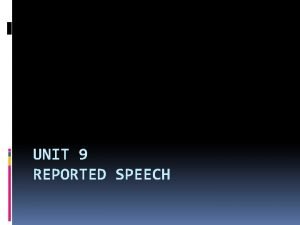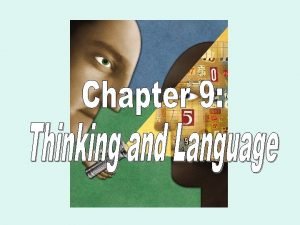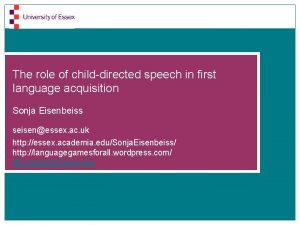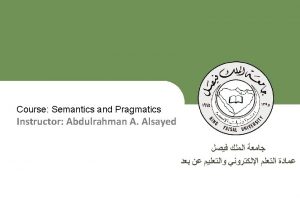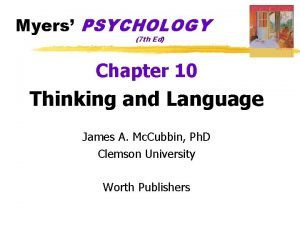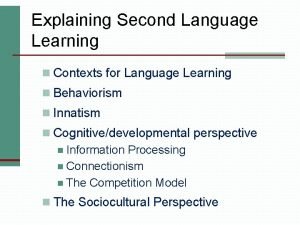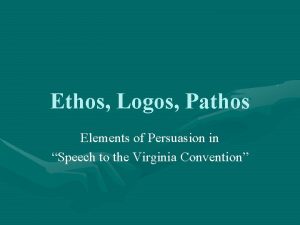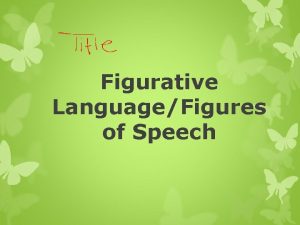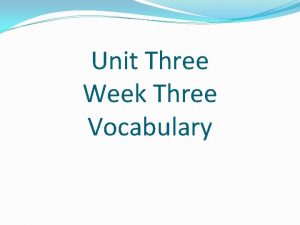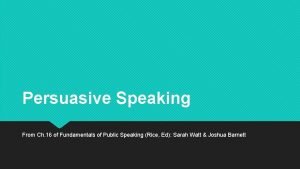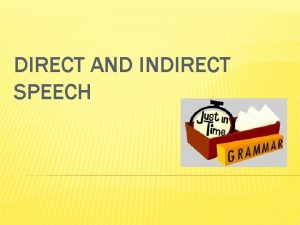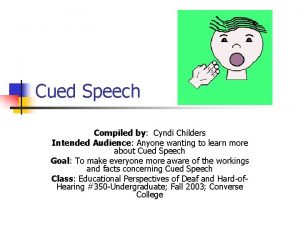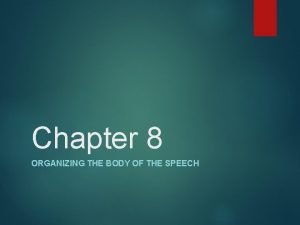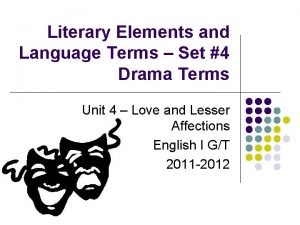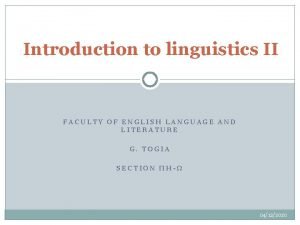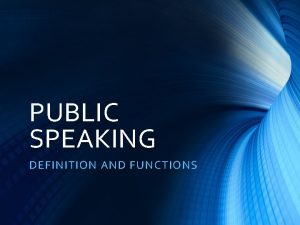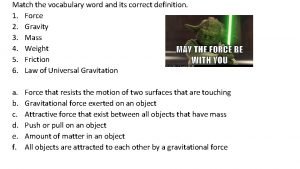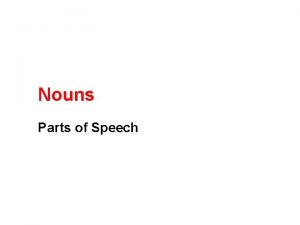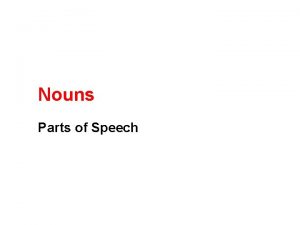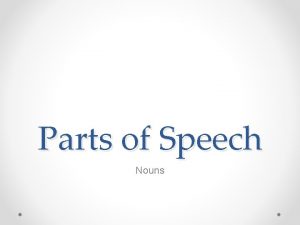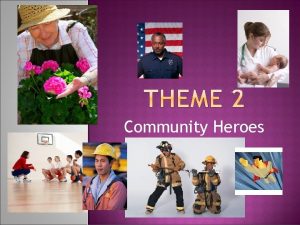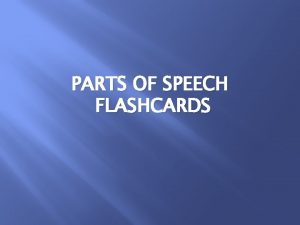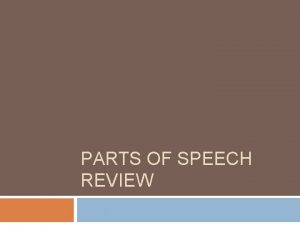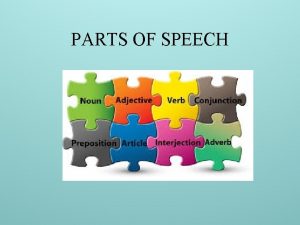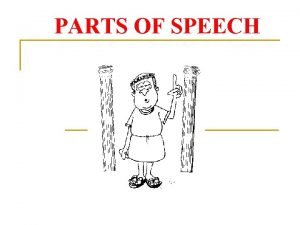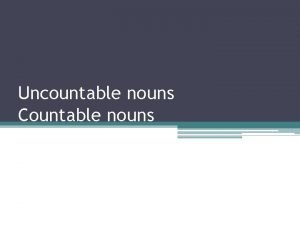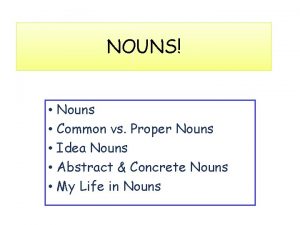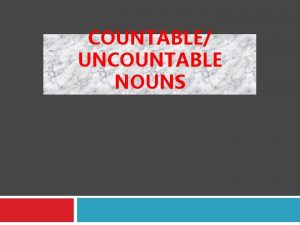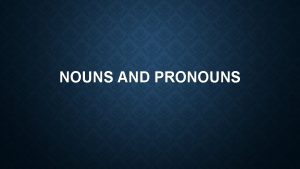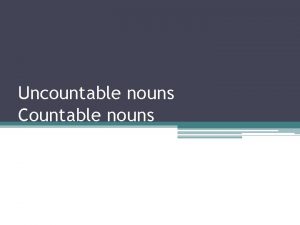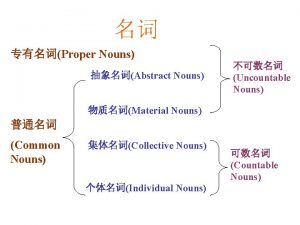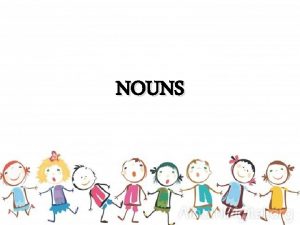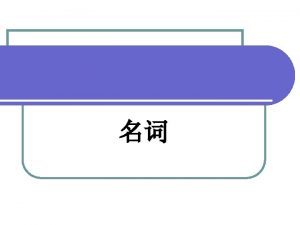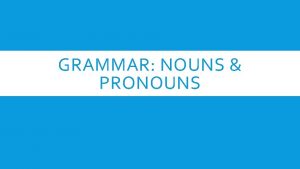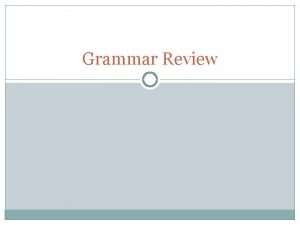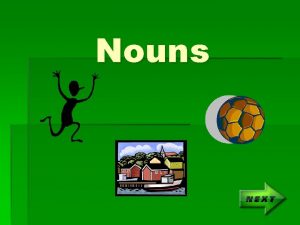Parts of Speech Nouns Nouns Definition Person place








































































































































































- Slides: 168

Parts of Speech

Nouns

Nouns • Definition: Person, place, or thing • Nouns can be: –Concrete or abstract –Singular, plural, or possessive –Common or proper

Concrete or Abstract Concrete: A physical person, place, or thing (ex. Jonah, West Town Mall, desk) Abstract: An idea or quality(ex. Happiness, peace, speed) If you can touch it, it is a concrete noun.

Concrete or Abstract Practice Directions: Label each word below a concrete noun or abstract noun. Then, write a sentence with each. Example A: costume Answer: concrete noun / I wore a costume for Halloween. 1. satisfaction- ______________ 2. school- ________________ 3. baby- ________________ 4. justice- ________________ 5. dream- ________________ 6. storm- ________________

Singular, Plural, Possessive Nouns have different forms. Singular: one noun (Ex: pencil, mess, Mike) Plural: more than one (Ex: pencils, messes, Mikes) Possessive: shows possession or ownership. (Ex: Mike’s, pencil’s, mess’s) *possession is shown with an apostrophe

Cont. Singular The bus has new tires. Singular Possessive The bus’s tires are new. Plural All the buses arrived early. Plural Possessive Many of the buses’ seats are old.

Common and Proper Common Noun: a general person, place, or thing. (ex. doctor, store, book) Proper Noun: a specific person, place, thing, or brand name. (ex. Doctor Phil, Target, Lord of the Flies)

Capitalization Rules

Noun Practice Take out a piece of paper. A noun will be displayed. You will write whether it is… Singular, plural, or possessive Concrete or abstract Common or proper Example schools = plural, concrete, common noun

1 dogs 2 Big Mac

3 Tyler’s 4 glasses

5 beauty 6 Xbox One

7 crime 8 Wednesday’s

9 shirts 10 politness

Pronouns


The What & Why of Pronouns • Root (Latin pro, for; nomen, noun) = a word that replaces a noun • To avoid repetition • Antecedent= noun replaced (ante, before; cedo, go) • Juan is my cousin. He (Juan) is in your English class. • Juan = antecedent. He = pronoun.

7 KINDS OF PRONOUNS 1. 2. 3. 4. 5. 6. 7. PERSONAL = refers to persons, he, she REFLEXIVE = refers back to the subject INTENSIVE = emphasizes the subject DEMONSTRATIVE = points to with gesture INDEFINITE = unsure, some, few INTERROGATIVE = question words, who RELATIVE = relates 2 sentences (which)

Here’s the Idea The word that a pronoun refers to is called its antecedent. REFERS TO Ramon visited Death Valley, and he was impressed.

Personal Pronouns A pronoun is a word that takes the place of one or more nouns. The most frequently used pronouns are called personal pronouns. They refer to people or things.

Pronouns such as we, I, he, them and it are called personal pronouns. Personal pronouns have a variety of forms to indicate different persons, numbers, and cases.

There are first-person, second-person, and third-personal pronouns, each having both singular and plural forms.

Singular I went out. Plural We left early. FIRST PERSON You left too. You are leaving. SECOND PERSON He came by bus. THIRD PERSON SECOND PERSON They came by car. THIRD PERSON

Here’s the Idea Each personal pronoun forms three cases: subject, object, and possessive.

Subject Pronouns A subject pronoun is used as the subject of a sentence. She is my best friend. It is my dog. Does he know the answer? You and I will meet later.

Object Pronouns An object pronoun is used as the direct/indirect object or the object of a preposition. Give the book to me. The teacher gave her a reprimand. I will tell you a story. Susan read it to them.

When in a pair (Susan and I) Always take the pronoun OUT of the pair to see which pronoun is the correct one to use. EXAMPLES: Richard and (I or me) recited the story. Jennifer helped Richard and (I or me). Read sentence without the words that the pronoun is paired with to see what works (word in white).

List of Personal Pronouns Singular Subject Pronouns Object Pronouns Plural I you he, she, it we you they me you him, her, it us you them

ACTIVITY 1 1. Write sentences in your groups using each of the subject pronouns. Underline each subject pronoun. 2. Write sentences using each of the object pronouns. Circle each object pronoun. Total of 16 pronouns. You can combine subject and object pronouns in you sentences.

PRONOUNS AND ANTECEDENTS Read the following sentences. Can you tell to whom the word She refers? Arachne competes with Athena. She weaves skillfully. The sentence is not clear because the word She could refer to either Arachne or Athena. Sometimes you must repeat a noun or rewrite the sentence. Arachne competes with Athena weaves skillfully.

PRONOUNS AND ANTECEDENTS The noun or group of words that a pronoun refers to is called its antecedent. When you use a pronoun, you should be sure that it refers to its antecedent clearly. Be especially careful when you use the pronoun they. Read the following sentence. They have several books about Greek myths at the library. Continue

PRONOUNS AND ANTECEDENTS The meaning of They is unclear. The sentence can be improved by rewriting it in the following manner. Several books about myths are available at the library.

PRONOUNS AND ANTECEDENTS When using pronouns, you must also make sure that they agree with their antecedents in number (singular or plural) and gender. The gender of a noun may be masculine (male), feminine (female), or neuter (referring to things). Notice how the pronouns on the next slide agree with their antecedents. Continue

Personal pronouns have three gender forms: • masculine he, his, him • feminine she, hers • neuter it, its

her Agatha Christie sets many of her stories in England. The hero has to use all his wits to solve the crime.

PRONOUNS AND ANTECEDENTS 1. The myth of Arachne is amusing. I enjoyed it. 2. The bystanders see Athena. They watch her at the loom. In the first sentence, myth is the antecedent of the pronoun it. In the second sentence, bystanders is the antecedent of They, and Athena is the antecedent of her.

ACTIVITY 2 Directions: Read each sentence below. Write each pronoun and label it singular or plural. Example A‐ He is one of the top students in the class because he studies hard He‐ singular 1. You are late for school, so get your backpack and hurry up! __________________ 2. The teacher told her to complete her assignment before leaving class. __________________ 3. After school, they will go to the movies with their friends. __________________ 4. I want to do well in school so that I am prepared for my future career. __________________ 5. Tell him to wait outside so his mom can pick him up after school. __________________ 6. The teacher told me that I couldn’t go to the restroom during class time. __________________ 7. They are the best class in the entire school because they listen to their teacher and parents. __________________ A pronoun is a word that may take the place of one or more nouns.

Using Pronouns Correctly Subject pronouns are used in compound subjects, and object pronouns are used in compound objects. He and Carmen wrote a report on the subject. (Not Him and Carmen) Tell John and me about Hercules. (Not John and I) Continue

Using Pronouns Correctly A preposition takes an object, just as many verbs do. The object of a preposition can be simple or compound. In either case, use an object pronoun as the object of the preposition. Lee read a famous myth to me. Lee read a famous Roman myth to John and me. Continue

Using Pronouns Correctly If you are not sure of which form of the pronoun to use, say the sentence aloud with only the pronoun as the subject or the object. Your ear will tell you which form is correct. Whenever the pronoun I is part of a compound subject, it should always be placed after the other parts of the subject. Similarly, when the pronoun me is part of a compound object, it should go after the other parts of the object. Continue

Using Pronouns Correctly Lee and I read some ancient Roman myths. (Not I and Lee) Mythology interests Lee and me. (Not me and Lee). Continue

Using Pronouns Correctly In formal writing and speech use a subject pronoun after a linking verb. The writer of this report was she. It is I. Continue

ACTIVITY 3

Possessive Pronouns A possessive pronoun is a pronoun that shows who or what has something. A possessive pronoun may take the place of a possessive noun. Read the following sentences. Notice the possessive nouns and the possessive pronouns that replace them. Continue

Possessive Pronouns Homer’s story is famous. His story is famous. This story is Homer’s. This story is his. Possessive nouns are in green. Possessive pronouns are in red. Continue

Possessive Pronouns Possessive pronouns have two forms. One form is used before a noun. The other form is used alone. Used before nouns Used alone Singular Plural my your his, her, its mine yours his, hers, its our your their ours yours theirs Continue

Possessive Pronouns Possessive pronouns are not written with apostrophes. The pronoun its, for example, shows possession. The word it’s, on the other hand, is a contraction of it is. Read the following sentences. Notice the meaning of the words in red type. Its central character is Odysseus. (possessive pronoun) It’s about the adventures of Odysseus. (contraction of It is)

Activity 4 Directions: In the items that follow, choose the option that corrects an error in the underlined portion(s). If no error exists, choose “No change is necessary. ” Show me what you know.

Item 1 Not only my brothers but also Mom loves to drench their omelets in in ketchup. A. his B. her C. his and her D. No change is necessary.

Item 2 The students and their professor sweated in in the A hot classroom. Each one of of them wondered why B they had they she haddecidedto to tocommitto to tosummerschool. C A. B. C. D. his or her Every she No change is necessary.

Item 3 Robert and Sue Ellen concentrated on the dead worm on the dissection tray. They used tweezers to pick through innards looking for the heart. A. He B. She C. He or she D. No changeisisnecessary.

Item 4 The students have decided to eat at Tito’s Taco Palace, where they can order the special. Their Its A BB discount burrito and soda will satisfy hunger, and its C cheap prices will help wallets! A. B. C. D. he or she Its their No change is necessary.

Item 5 Either of these thick books by respected authors will have the answer to your research question in their many pages. A. his B. his or her C. its D. No change is necessary.

Item 6 If everyone people stopped to to smell tosmell the the roses, they might AA BB get stung by bees and have their allergies kick in in to to C overdrive! A. B. C. D. people he or she his or her No change is necessary.

Item 7 Weaver Hill High has strange school colors. Their hot pink and bright yellow combination really stands out on the field. A. Its B. His C. His and her D. No change is necessary.

Item 7 Weaver Hill High has strange school colors. Their hot pink and bright yellow combination really stands out on the field. A. Its B. His C. His and her D. No change is necessary.

Item 8 Sam is starving, and his buddies have just ordered their “upsized” meals. Despite Sam’s drooling, A neither of them will part with their. French his Frenchfries. B CC A. B. C. D. his him his No change is necessary.

Item 9 Clyde refuses to return to the weight room because its staff always pokes fun of of his skinny arms and legs. A. their B. his C. her D. No changeisisnecessary.

Item 10 The students should memorize a Shakespeare Everyone should memorize aa. Shakespeare AA monologue for Mrs. Smith because the extra credit points them improve their averages points will help them improve theiraveragesatat at B C the end of of the semester. A. A. B. B. C. C. D. D. The students him or or her his or or her No No change is is necessary.

Indefinite Pronouns An indefinite pronoun is a pronoun that does not refer to a particular person, place, or thing. Does anyone know the story of Midas? Most indefinite pronouns are either singular or plural. Continue

Some Indefinite Pronouns Singular another anybody anyone anything each either everybody everyone everything much neither nobody Plural no one nothing one somebody someone something both few many others several All, any, most, none and some can be singular or plural, depending on the phrase that follows them. Continue

Some Indefinite Pronouns When an indefinite pronoun is used as the subject, the verb must agree with it in number. Everyone discusses the plot. (singular) Both talk about King Minos. (plural) All of mythology is about beliefs and ideals. (singular) All of the myths are about beliefs and ideals. (plural) Continue

Some Indefinite Pronouns Possessive pronouns often have indefinite pronouns as their antecedents. In such cases, the pronouns must agree in number. Note that in the first example the intervening prepositional phrase does not affect the agreement. Each of the characters has his or her motive. Several have conflict with their rivals. Continue

Activity 5 Indefinite Pronouns Worksheet Directions: Write a sentence with each indefinite pronoun listed below. Example A: any Answer: Do you have any idea about what is going to happen? 1. somebody________________________________ 2. few________________________________ 3. many________________________________ 4. several________________________________ 5. all________________________________ 6. someone________________________________ 7. another________________________________

Reflexive Pronouns A reflexive pronoun refers to a noun or another pronoun and indicates that the same person or thing is involved. Reflexive pronouns are formed by adding –self or –selves to certain personal and possessive pronouns The woman found herself a book of folktales. Reflexive Pronoun Continue

Reflexive Pronouns Singular myself yourself himself, herself, itself Plural ourselves yourselves themselves Sometimes hisself is mistakenly used for himself and theirselves for themselves. Avoid using hisself and theirselves. Continue

Intensive Pronouns An intensive pronoun is a pronoun that adds emphasis to a noun or pronoun already named. George himself bought a copy of American Tall Tales. He himself paid for the book. Continue

Demonstrative Pronouns POINT OUT SPECIFIC PERSONS / THINGS • I hate this. • Did Megan give you that? • She wants these. • Will you be using those?

Interrogative Pronouns PRONOUNS USED TO ASK QUESTIONS • What is the answer to the last question? • Whose book is this? • Who are you? • Whom did you send to the store? Who, Whom, Whose, What, When, Where

RELATIVE PRONOUN • RELATIVE PRONOUN RELATES TO A PRECEDING WORD (ANTECEDENT) AND JOINS TO IT A DEPENDENT CLAUSE • 2 JOBS: A PRONOUN + A CONNECTOR She is a woman. She runs for mayor. • She is the woman, who runs for mayor. You saw the house. It is historical landmark. • The house that you saw is a historical landmark.

Summary 7 KINDS OF PRONOUNS • PERSONAL = REFERS TO PERSONS • REFLEXIVE = ACTION BACK TO SUBJECT • INTENSIVE = EMPHASIZES ACTION • DEMONSTRATIVE = POINTS WITH A GESTURE • INDEFINITE = UNSURE SOME OR FEW • INTERROGATIVE = QUESTION WORDS • RELATIVE = JOINS SENTENCES

Verbs

Verbs • As you know, every sentence has two parts, the subject and the predicate. • The key word in the predicate is the verb. • The verb tells what the subject of the sentence is, has, does, or feels. – Burt works at the park. – He trims the trees. – He loves his job. – He paints the benches.

Action Verbs • Most verbs are action verbs. Some action verbs refer to physical action that can be seen by other people. • Others refer to mental action that cannot be seen. – Physical Action: The gardener feeds the ducks. – Mental Action: She likes the migrating birds best.

Being Verbs • Other verbs express a state of being. • These verbs do not refer to action of any sort. They simply tell what the subject is. – Burt is the gardener’s assistant. – He seems afraid of the swans. – One swan looks angry. – In fact, swans are hungry.

The most common being verbs are forms of be itself. • • Am is Are Was Were Be Being been

Other being verbs: • • • Appear Become Feel Grow Look Seem Remain Smell Sound Stay taste

Identify each verb in the sentences below. Does it express action or being? 1. We parked and locked our bicycles in the rack at the library. 2. Many, many resources were available there. 3. I considered several books about wild animals. 4. All of the books looked interesting. 5. Finally, I decided on one about tropical birds. 6. The book described many birds from countries in Central and South America. 7. I especially liked the photographs in the book. 8. The pictures of the birds are very colorful. 9. Some of the birds’ feathers are pink, orange, red, and green. 10. I carried the book home in my backpack.

Linking Verbs • A verb that expresses a state of being often functions as a linking verb. • A linking verb links, or connects, the subject with a noun or an adjective in the predicate that names or describes the subject. – Peanut is a toad. – Peanut is tiny.

Some verbs can function as either linking verbs or action verbs. Linking Verbs Action Verbs The lily pond smells stagnant. The squirrel smells its food. The gardener felt tired. She felt the tree’s thick leaves.

• To help you decide whether one of these verbs is a linking verb, try substituting is or are for the verb. If the sentence still makes sense, the verb is probably a linking verb. – The pigeons look comical. (The pigeons are comical) – The swan’s hiss sounds fierce. (The swan’s hiss is fierce)

Which sentence in each of the following pairs contains a linking verb. • 11. A monkey appears from behind a tree. It appears excited. • 12. The young deer grew taller. The male deer grew antlers. • 13. The koala baby looks cute. It looks for its mother. • 14. The koala tastes a leaf. Does it taste good? • 15. We smell the eucalyptus tree. It smells pleasant. • 16. We feel the tree’s bark. It feels smooth.

List the verbs in the sentences below. Label each verb action or being. • 17. Photographs, television, and movies show us a variety of unusual creatures. • 18. We can see animals in their natural habitat in national parks, nature sanctuaries, or even city parks. • 19. Few animals look strange to us today. • 20. Some animals still seem unusual, however. • 21. The anteater is one example. • 22. The head and snout of this animal form a long tube. • 23. A giant anteater becomes six feet long. • 24. It grows a coarse coat of hair. • 25. The front toes and claws of the anteater fold under. • 26. The animal actually walks on its knuckles.

List the verbs in the sentences below. Label each verb action or being. • 27. The giant anteater usually appears shy. • 28. It enjoys dark, wet tropical forests. • 29. Ants and termites appear in this animal’s diet. • 30. The anteater is a peaceful animal.

Irregular Verbs

Verb Forms I know you can say hook , hooked. . . But can you say took, tooked?

This presentation covers the use of standard A verb form item on an regular and objective test might look irregular verb forms. like this. . .

Sample Item Thomas sang along until the CD CD ended; then as as A he was choosingaanew newdisk, he helostcontrolofof B the car and drivedinto drove intoaaditch. C A. B. C. D. sung chosing drove No change is necessary. Is sang, Drived is choosing, or incorrect, which drived a badly option C fixes. formed verb?

Regular verbs have reliable forms. Infinitive to laugh to start to travel Simple Present laugh(s) start(s) travel(s) Simple Past laughed started traveled Or to fish, fish(es), fished, fishing! Past Participle laughed started traveled Present Participle laughing starting traveling

Irregular verbs, however, have no consistent patterns. Infinitive to drive to think to drink to swim Simple Present drive(s) think(s) drink(s) swim(s) Simple Past drove thought drank swam Past Participle driven thought drunk swum Present Participle driving thinking drinking swimming For example, to catch, catch(es), caught, catching!

On many objective exams, you cannot use a dictionary to look up the correct form! X

When in doubt, rely on “gut” feelings. Your eyes have seen in print — and your brain has registered — all of the possible verb forms that you will encounter for this skill. If you don’t recognize the right answer, go with the one that feels right. Hey, I’ve seen that verb before!

Don’t confuse of and have. Instead of skipping class to go fishing, Yolanda should of have studied for accounting her studied for her exam. accounting exam. My grade was a disaster!

Confirm that used to is in the past tense. Now that he’s older, Fred has a full-time job, but he used to spend summers fishing. to spend hishis summers fishing. You’re a bad influence!

Quick Test Directions: In the items that follow, choose the option that corrects an error in the underlined portion(s). If no error exists, choose “No change is necessary. ” Show me what you know.

Item 1 We knew that Charley had hidthe hidden thecookies the cookies inin in A BB his bedroom, so we stole his key and searched in in C all the dresser drawers. A. B. C. D. knowed hidden stealed No change is necessary.

Item 2 If we had known that you were serving squid eyeball stew, we would of of comefor fordinner! A. of came B. have came C. have come D. No change is necessary.

Item 3 Priscilla use to used totohaveaa apet petparakeet; her hermother’s AA story is that the bird escaped and flew away, but B Priscilla believes that the cat ate it. C A. B. C. D. used flied eaten No change is necessary.

Item 4 Julissa was soaked during the afternoon thunderstorm because she had choosedtotowalktoto school rather than drive. A. B. C. D. chosen choosen chose No change is necessary.

Item 5 James brungroses brought roses and and begged forgiveness, butbut AA when Rhonda saw that her ex ex still hadn’t shaved B his ridiculous mustache, she shut the door in in his C face. A. B. C. D. brought seen shutted No change is necessary.

Item 6 If Toby had tooken. Charlene’sadvice, thatbottleof of soda wouldn’t have exploded all over the front of his new white shirt. A. took B. tooked C. taken D. No change is necessary.

Item 7 Cooper laid the 10 -page paper on on Professor A Cook’s desk; he had wrote the written the last sentence at atat B 2: 50 p. m. , and then he ran across campus to to C deliver the work by the 3 o’clock deadline. A. B. C. D. layed written run No change is necessary.

Item 8 We would have knowenthat. Dr. Carlsonhad moved up the date of the quiz if we attended her calculus class more frequently. A. of knowen B. have known C. have knew D. No change is necessary.

Item 9 Margaret breaked broke the the cookie and and gave half tototo AA BB the young man stuck in the elevator with her; they told stories to to pass the time as as mechanics C worked on the hydraulics. A. B. C. D. broke gived telled No change is necessary.

Item 10 Meredith would have wentto tothe theconcert, but Gregory misplaced the tickets, which they still haven’t found. A. of went B. have gone C. have goed D. No change is necessary.

Verbs Tense

USE PRESENT TENSE • In universally true statements not limited to a particular time: – The sun is ninety million miles from Earth. • In definitions: – Hardware is the physical system of a computer. • In statements about the content of literature and other published works: – Hamlet is extremely indecisive.

USE PAST TENSE • For historical or past information: – Malcolm X said, “If you don’t stand for something, you’ll fall for anything. ”

USE PRESENT PERFECT TENSE • (the present form of have (have or has) with a past participle verb form) • For an action that began in the past but continues into the future: – I have lived in Pensacola all my life.

USE PAST PERFECT TENSE • (the past form of have (had) with a past participle verb form) • For an earlier action that is mentioned after a later action: – Marvin bought the car that he had seen advertised in the paper. (First, he saw it; then he bought it. )

USE FUTURE PERFECT TENSE • (the auxiliary will have or shall have with a past participle verb form) • For an action that will have been completed at a specific future time: – By 2010, I shall have graduated.

USE A PRESENT PARTICIPLE VERBAL • (-ing verb form used as an adjective) • For an action that occurs at the same time as the verb: – Speeding down the interstate, I saw a police officer.

USE A PAST PARTICIPLE VERB FORM Only with auxiliary/helping verbs (is, are, was, were, has, have, had): The professor has already (went) gone over the assignment, and I have (wrote) written the paper. The bell has (rang) rung. I should have (came) come to class sooner. I have (did) done my work.

USE SUBJUNCTIVE MOOD • To express a condition contrary to fact or a wish: – If I were President, I'd lower taxes. • To express insistence, importance, necessity, or urgency after the word that: – It is important that you be on time. – We demand that the company do something about its toxic waste. – The syllabus requires that each student write a research paper.

Let’s Practice!!! • I have already (spoken, spoke) to the optician about my new pair of contact lenses. • SPOKEN • In college, I hope (to study, to have studied) subjects which will be useful to me later. • TO STUDY • We were told at the service station that it (is, was) at least fifty miles from Plattsburg to Saranac Lake. • IS

More Practice!!! • It is necessary that our signatures (are, be) witnessed by a notary. • BE • Have you ever (flew, flown) coast to coast using Eastern Airlines’ excursion rates? • FLOWN • If Ted (had apologized, would have apologized) I would have forgiven him. • HAD APOLOGIZED

Active/Passive

Active and Passive Voice • VOICE indicates if the subject acts or is being acted upon. • ACTIVE VOICE: Kristen wrote the report (the subject, Kristen, acts). • PASSIVE VOICE: The report was written by Kristen (the subject, the report, was acted upon).

Active and Passive Voice • When you use the ACTIVE VOICE, you achieve greater precision when you answer who or what performs each action.

Active and Passive Voice • The problem with PASSIVE VOICE is that it begs this question: Who or what performed the action? • Some passive sentences quickly answer the who or what question with a prepositional phrase: The report was written by Kristen. The preposition is wordy and identifies the actor too late.

Active and Passive Voice To eliminate the passive voice: • Find and mark the passive voice: it always has a “to be” verb (is, are, was, were, been …) plus another verb. Example: The report was written by Kristen.

Active and Passive Voice To eliminate the passive voice: • Answer the question who or what does the action. Example: Kristen wrote the report.

Active and Passive Voice To eliminate the passive voice: • Make the answer the subject of the verb. Example: Kristen wrote the report.

So What? • Although both constructions are grammatically correct, the active voice is usually more effective in academic and business writing because it is simpler and more direct. The passive construction is effective only when the doer of the action is unknown or irrelevant. Examples – The cruise liner was hijacked. – The ball was hit. – The town was quarantined.

Review • Active voice verbs: Verbs that indicate the sentence’s subject as actively acting: – Marvin hit the ball. • Passive voice verbs: Verbs that indicated the sentence’s subject as being acted upon: – The ball was hit by Marvin

Practice Decide which of the following sentences use the passive voice and which sentences use the active voice. Correct the sentences that contain either inappropriate uses of passive voice or an abrupt shift from active to passive voice. Example: -Before I began my research, only German fascism was studied by me. Passive construction -Before I began my research, I only studied German fascism.

Professor Warren assigned each group a research project; however, the documentary sources were not located. Incorrect Active-Passive Shift Professor Warren assigned each group a research project; however, he could not locate the documentary sources.

For the opening flag ceremony, a dance was choreographed by Kema Jones to Bill Withers’ song “Lean on Me. ” Passive Construction For the opening flag ceremony, Kema Jones choreographed a dance to Bill Withers’ song “Lean on Me. ”

When the tickets are ready, the travel agent notifies the client. Each ticket is then listed on a daily register form, and a copy of the itinerary is filed. Incorrect Active-Passive Shift When the tickets are ready, the travel agent notifies the client. The agent then lists the ticket on a daily register form and files a copy of the itinerary.

Seismologists have examined data concerning the recent earthquake, and reports will be filed. Incorrect Active-Passive Shift Seismologists have examined data concerning the recent earthquake, and they will file reports.

Problems of famine, pollution, dwindling resources, and arms control were discussed by the senator. - Passive construction The senator discussed problems of famine, pollution, dwindling resources, and arms control.

• Whenever an error was found by Mrs. Clark, the entire paper had to be rewritten by the student. Passive Construction Whenever an error was found by Mrs. Clark, the student had to rewrite the entire paper.

Verbals

Inf init ive Par tici ple Ge run d Verbals

Verbal Phrase = • A phrase that is centered around a verb form. • This verb form is NOT used as a verb in the sentence • It is used as a noun, noun adjective or adverb There are 3 kinds of verbals or verbal phrases: GERUND PARITCIPLE INFINITIVE

Gerund What? NO UN - ing

Gerund / Gerund Phrase • …centers around a verb form ending in -ING • …is always used as a noun • …is never surrounded by commas (except for appositives) • Caution! -ING verb forms can also be verbs or adjectives (These are NOT gerunds. ) • …can be used in each of the 6 noun positions

Not all -ING words are Gerunds: • • morning evening something nothing anything everything She is driving to school today.

Gerund / Gerund Phrase EXAMPLES: • Swimming the mile is my best event. • I like swimming the mile. • My best event is swimming the mile. • I gave swimming the mile a try. • He lectured us about swimming the mile. • My best event, swimming the mile, was canceled.

Gerund / Gerund Phrase ANSWERS: • Swimming the mile is my best event. (Subject) • I like swimming the mile. (DO) • My best event is swimming the mile. (PN) • I gave swimming the mile a try. (IO) • He lectured us about swimming the mile. (OP) • My best event, swimming the mile, was canceled. (APP)

Gerund / Gerund Phrase EXAMPLES: • His sister was dancing in the show. • I hate practicing the piano. • I gave my mom’s cooking a perfect 10. • Sitting by the pool is quite relaxing. • Wishing upon a star, Sue imagined a better life. • While I was walking on the beach, I found a sand dollar.

Gerund / Gerund Phrase ANSWERS: • His sister was dancing in the show. (not a gerund, verb phrase) • I hate practicing the piano. (DO) • I gave my mom’s cooking a perfect 10. (IO) • Sitting by the pool is quite relaxing. (S) • Wishing upon a star, Sue imagined a better life. (not a gerund, participial phrase) • While I was walking on the beach, I found a sand dollar. (not a gerund, clause) clause

Gerund / Gerund Phrase EXAMPLES: • Becoming a doctor takes years of serious study. • Kino’s specialty is cooking mushrooms. • The subtle squeaking of the door hinges told Mira that her sister was home. • Carla decided on writing about famous women in history. • Mr. Riley enjoys the crackling of a campfire on a winter’s evening.

Gerund / Gerund Phrase ANSWERS: • Becoming a doctor takes years of serious study. (S) • Kino’s specialty is cooking mushrooms. (PN) • The subtle squeaking of the door hinges told Mira that her sister was home. (S) • Carla decided on writing about famous women in history. (OP) • Mr. Riley enjoys the crackling of a campfire on a winter’s evening. (DO)

Gerund / Gerund Phrase EXAMPLES: • Traveling to new and interesting places is fun. • The smiling child amused his parents. • Give playing golf another chance. • Pam is studying for her French exam. • Holding onto the kite, Jeremy received a cut.

Gerund / Gerund Phrase ANSWERS: • Traveling to new and interesting places is fun. (S) • The smiling child amused his parents. (not a gerund, participle) • Give playing golf another chance. (IO) • Pam is studying for her French exam. (not a gerund, verb phrase) • Holding onto the kite, Jeremy received a cut. (not a gerund, participial phrase)

Gerund / Gerund Phrase patterns to look for… Subject + verb … Subject + linking verb + PN Subject + action verb + DO Subject + action verb (usu. give) + Preposition + S, Appositive , verb… (Other combinations are possible for this one. ) OP IO DO

Participle What kind? -ing -d AD JE CT IVE Which one? -ed -n -en -nt

Participles… • are verb forms that act like adjectives. • can end in –ing, -d, -ed, -n, -en, nt • will come as close as they can to the noun they modify • can come BEFORE or AFTER the noun it modifies

Participles Examples: • The frowning clown fell down. (article/ adj. /noun) • The clown, frowning at the crowd, fell down. • Frowning at the crowd, the clown fell down.

Participial Phrases… • may fall at the beginning of the sentence. • If so, it will be separated from the sentence with a comma Example: • Bent by the wind, the tree finally fell over.

Find the participles: • The fallen tree blocked the road. • Mary had to replace the soiled carpet. • Mike’s goal was hiking the Rockies. • The running water eroded the soil. • We finally got our own swimming pool. • Eating jalapeno peppers can be painful.

Find the participles (Answers) • The fallen tree blocked the road. • Mary had to replace the soiled carpet. • Mike’s goal was hiking the Rockies. (gerund) • The running water eroded the soil. • We finally got our own swimming pool. • Eating jalapeno peppers can be painful. (gerund)

Find the participial phrases: • Running quickly, the puppy caught up with the family. • Seeing my family made me feel safe. • Bending in the wind, the tree finally fell. • The wind, whipping through the valley, did extensive damage. • I saw my uncle waiting for me.

Find the participial phrases (Answers) • Running quickly, the puppy caught up with the family. • Seeing my family made me feel safe. (gerund) • Bending in the wind, the tree finally fell. • The wind, whipping through the valley, did extensive damage. • I saw my uncle waiting for me.

Find the participial phrases: • Granny’s goal, quilting a huge quilt, will have to wait until spring. • Martha’s hobby is sewing for the family. • Sitting by the dock, Bob felt lonely. • The boy sitting by the bay was my cousin. • Not watching his steps, the toddler fell down.

Find the participial phrases (Answers) • Granny’s goal, quilting a huge quilt, will have to wait until spring. (gerund / appositive) • Martha’s hobby is sewing for the family. (gerund) • Sitting by the dock, Bob felt lonely. • The boy sitting by the bay was my cousin. • Not watching his steps, the toddler fell down.

Participle / Participial Phrase patterns to look for… participial phrase , Subject + verb… Subject, participial phrase , verb… Subject + verb +DO participial phrase Preposition + OP Article participial phrase Noun

Infinitive NO UN /A VE DJ EC TI Why? (ADV. ) /A What kind? (ADJ. ) DV ER Which one? (ADJ. ) B What? (NOUN) to + verb

Infinitive RULES: • Center around TO + verb • Verb is “naked” – No endings (-ing, -ed, etc. ) • Examples: to go, to sit, to talk, etc. • Can be used as noun, adj. or adv. • Caution! Do not confuse with prepositional phrases using “to” (to school, to me, to us, to them, to lunch, etc. )

Find the Infinitives • I wanted to go to the mall today. • My mom went to bed early. • Your cat ate too much food today. • To sleep all day is unhealthy. • I want to ask you a question.

Find the Infinitive Phrases: • I went to the pond to fish for bass. • I have to go to the mall before supper. • To make good grades, one must study. • My goal is to make good grades. • I sat with the team to give them my support. • Don’t try to get out of here too fast.

Infinitive Phrases used as NOUNS: NOUNS • I want to get a car for my birthday. • My goal is to get a car for my birthday. • To get a car for my birthday would be wonderful. • My goal, to get a car for my birthday, may never happen. Which two noun positions are not used?

Infinitive Phrases used as ADJECTIVES: ADJECTIVES • The movie to see is Avatar. • I missed the road to take to the beach. • The place to see moose is Canada. • I need a place to keep my book bag. Adjective infinitive phrases will come directly after a noun and modify it by answering “which? ” or “what kind? . ”

Infinitive Phrases used as ADVERBS: ADVERBS • I went to the pond to fish. • To get into Harvard, you must study. • I am happy to be here. • I am sad to see you go. An infinitive phrase that comes first in a sentence MAY be an adverb, but it will have a comma after it. Adverb infinitive phrases usually answer “why? ” or “how? . ”

Some famous Infinitives : • “To be or not to be, that is the question. ” • “To know me is to love me. ” • “You’ve got to live a little. ” • “I vant to drink your bloooooood. ” • “I wanna hold your hand. ” • “I’ve only just begun to fight. ” • “To boldly go where no man has gone before…” (split infinitive)

L oo k fo rp att ern s…
 Person place thing examples
Person place thing examples Compound nouns kitchen
Compound nouns kitchen Paragraph on noun
Paragraph on noun Person place thing idea examples
Person place thing idea examples Singular 1. person
Singular 1. person First person second person third person chart
First person second person third person chart Person person = new person()
Person person = new person() First second and third person
First second and third person Millions billions trillions chart
Millions billions trillions chart A wave is a disturbance that transfers
A wave is a disturbance that transfers A wave is a disturbance that transfers energy
A wave is a disturbance that transfers energy Pronouns take the place of nouns
Pronouns take the place of nouns Place pronouns
Place pronouns Take the place of nouns
Take the place of nouns Ruler countable or uncountable
Ruler countable or uncountable Shelf is common or proper noun
Shelf is common or proper noun Countable and uncountable
Countable and uncountable A river proper noun
A river proper noun Write a c for countable nouns or a u for uncountable nouns
Write a c for countable nouns or a u for uncountable nouns Unit 2 nouns lesson 7 nouns proper and common answer key
Unit 2 nouns lesson 7 nouns proper and common answer key Examples of singular and plural nouns
Examples of singular and plural nouns Count nouns and noncount nouns
Count nouns and noncount nouns Plural nouns y gender nouns
Plural nouns y gender nouns Proper noun meaning and examples
Proper noun meaning and examples Potaten
Potaten Person, place, thing or idea
Person, place, thing or idea Epidemiology person place time
Epidemiology person place time Noun phrase dog
Noun phrase dog A reference to a famous person place or event
A reference to a famous person place or event People, animals or objects in a story
People, animals or objects in a story When moving a person in segments, what do you move first?
When moving a person in segments, what do you move first? A noun is a person place or thing
A noun is a person place or thing Noun is the name of person
Noun is the name of person Paragraph with nouns
Paragraph with nouns Expanded noun phrases
Expanded noun phrases We is second or third person
We is second or third person First person vs third person writing
First person vs third person writing Person-job fit and person-organization fit
Person-job fit and person-organization fit Montag external conflict with society
Montag external conflict with society Private string name
Private string name When a person is logrolled the person is
When a person is logrolled the person is Language features of biography
Language features of biography A person's trash is another person's treasure
A person's trash is another person's treasure City of ember plot diagram
City of ember plot diagram Person a and person b
Person a and person b A person swings on a swing when the person sits still
A person swings on a swing when the person sits still Hi how are you doing?
Hi how are you doing? Figure of speech simile definition
Figure of speech simile definition How is public speaking similar to everyday conversation?
How is public speaking similar to everyday conversation? The person who initiates a speech transaction
The person who initiates a speech transaction Global, patchwork, and incremental are forms of
Global, patchwork, and incremental are forms of Prep impromptu speech
Prep impromptu speech Specialized ligaments attach the nail bed and
Specialized ligaments attach the nail bed and Pictures of a person born with both male and female parts
Pictures of a person born with both male and female parts Match the adverbs in direct speech and reported speech
Match the adverbs in direct speech and reported speech Pure speech definition
Pure speech definition Speech to the young
Speech to the young Quoted and reported speech
Quoted and reported speech Informative vs persuasive writing
Informative vs persuasive writing Past progressive reported speech
Past progressive reported speech Exclamation in reported speech
Exclamation in reported speech Direct and indirect speech wh questions exercises
Direct and indirect speech wh questions exercises We indirect speech
We indirect speech Speech to the young
Speech to the young Different types of sentences
Different types of sentences Direct and indirect speech
Direct and indirect speech Look at the direct speech and complete the reported speech
Look at the direct speech and complete the reported speech Direct speech words
Direct speech words Persuasive vs informative speech
Persuasive vs informative speech Reported speech tell and say
Reported speech tell and say Direct speech into reported speech
Direct speech into reported speech Yesterday evening reported speech
Yesterday evening reported speech Do you want to dance reported speech
Do you want to dance reported speech Quoted speech to reported speech
Quoted speech to reported speech Reported speech cuadro
Reported speech cuadro Bad verbs
Bad verbs Enable parts of speech
Enable parts of speech Sing parts of speech
Sing parts of speech Traditional parts of speech
Traditional parts of speech Part of speech jeopardy
Part of speech jeopardy Part of speech great
Part of speech great Conclusion for parts of speech
Conclusion for parts of speech Noun grade 6
Noun grade 6 Conjunctions jeopardy
Conjunctions jeopardy Nounsthename
Nounsthename 8 parts of speech
8 parts of speech Parts of speech flocabulary
Parts of speech flocabulary Www.youtube
Www.youtube Reported speech in arabic
Reported speech in arabic Parts of speech bingo
Parts of speech bingo Parts of speech jeopardy 7th grade
Parts of speech jeopardy 7th grade Part of speech strong
Part of speech strong Parts of speech doodle notes
Parts of speech doodle notes Information about parts of speech
Information about parts of speech Parts of speech warm up
Parts of speech warm up Parts of speech guided notes
Parts of speech guided notes What is minor parts of speech
What is minor parts of speech Inevitable synonym
Inevitable synonym Mary part of speech
Mary part of speech Examples of simple predicate
Examples of simple predicate Parts of speech interjection
Parts of speech interjection Parts of speech review game
Parts of speech review game Identify the part of speech
Identify the part of speech Parts of speech grade 5
Parts of speech grade 5 Parts of speech in english with examples
Parts of speech in english with examples Antonym for flabbergasted
Antonym for flabbergasted Daily parts of speech
Daily parts of speech Chapter 14: the phrase answer key
Chapter 14: the phrase answer key Adjectives with n
Adjectives with n Parts of speech
Parts of speech What is a verb
What is a verb What is verb
What is verb Parts of speech
Parts of speech 8 parts of speech
8 parts of speech Parts of speech foldable
Parts of speech foldable Part of speech
Part of speech Types of adjective phrase
Types of adjective phrase Morphology speech
Morphology speech 7 parts of speech
7 parts of speech Technology parts of speech
Technology parts of speech Compound complex
Compound complex 8 parts of speech
8 parts of speech Parts of speech mechanism
Parts of speech mechanism Interjection word
Interjection word What are the 8 parts of speech?
What are the 8 parts of speech? Simple subject
Simple subject How many parts of speech are there? *
How many parts of speech are there? * Determiner vs article
Determiner vs article Parts of speech warm up
Parts of speech warm up Optional part of formal letter
Optional part of formal letter Equal or unequal fractions
Equal or unequal fractions Functions of draw tube in microscope
Functions of draw tube in microscope Six chief parts of the small catechism
Six chief parts of the small catechism Five themes of geography definition
Five themes of geography definition What is the central place theory
What is the central place theory 5 themes of geography orlando florida
5 themes of geography orlando florida Movement five themes of geography
Movement five themes of geography Preposition of person
Preposition of person Definition of singular possessive noun
Definition of singular possessive noun Spiritual person definition
Spiritual person definition Person's point of view
Person's point of view What is the nec definition of a qualified person?
What is the nec definition of a qualified person? Dental supply person definition
Dental supply person definition Competent person definition
Competent person definition Main conflict definition
Main conflict definition Que es reported speech
Que es reported speech Cognition refers to
Cognition refers to Child directed speech definition
Child directed speech definition Motivational speech definition
Motivational speech definition Speech act theory
Speech act theory Overextension in psychology
Overextension in psychology Onomatopoeia figure of speech examples
Onomatopoeia figure of speech examples Morpheme examples psychology
Morpheme examples psychology Universal grammar
Universal grammar Elements of persuasion
Elements of persuasion Kairos ethos pathos logos
Kairos ethos pathos logos Personification figure of speech
Personification figure of speech Poise definition in speech
Poise definition in speech Definition of persuasive speech
Definition of persuasive speech Definition of reported speech
Definition of reported speech Cued speech definition
Cued speech definition What is an internal summary
What is an internal summary Speech acts
Speech acts Macbeth soliloquy is this a dagger
Macbeth soliloquy is this a dagger Oxymoron figure of speech
Oxymoron figure of speech Hành động nói
Hành động nói Public speaking definitions
Public speaking definitions Value persuasive speech
Value persuasive speech Match the vocabulary word with the appropriate definition
Match the vocabulary word with the appropriate definition

